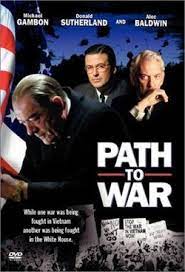
PATH TO WAR
US, 2002, 165 minutes, Colour.
Michael Gambon, Donald Sutherland, Alec Baldwin, Bruce Mc Gill, James Frain, Felicity Huffman, Frederic Forest, John Aylward, Philip Baker Hall, Tom Skerritt, Diana Scarwid, John Valenti, JK Simmons Gary Sinese.
Directed by John Frankenheimer.
Path to War, John Frankenhiemer’s last film, 2002. Offering the opportunity to evaluate and re-evaluate. Especially the Vietnam war looked at in retrospect, dramatising the events almost 40 years later.
Bryan Cranston as well as Woody Harrelson have portrayed LBJ. But, discovering Sir Michael Gambon as Johnson really bringing him to vivid life is powerful. Big, brash, prone to anger, yet skilled in politicking, working behind the scenes (a cameo sequence when Johnson cajoles racist Alabama governor, George Wallace, to moderate his stance quickly comes to mind). Opening with the post-election celebration, State of the Union address, 1965, elation. There were also the Civil Rights issues, behind the scenes and Johnson’s contact with Martin Luther King, his response to the Selma March. But there was ever the path to war.
The screenplay Bu Daniel Giat is very well and thoughtfully written, performances from a wide range of character actors, exemplary. Intriguing to watch and to think back about Clark Clifford, initially dovish then hawkish (embodied by Donald Sutherland) and, since we remember much more about him, of Alec Baldwin’s career best performances as Robert Mc Namara, confidently hawkish, disturbed by protests, wanting more understanding. And the reminder, after all those cabinet meetings, listening to the rather warmongering generals (not concerned about civilian deaths collateral), that with all the advice, the final decisions always rested with Johnson.
One of the best HBO dramas on American politics,
- A portrait of American politics? The presidential portrait? The issues of the mid-1960s?
- The 1960s, the election of JF Kennedy, Lyndon Baines Johnson as VP? The Berlin Wall, communism, the Bay of Pigs, the Cuban missile crisis, the assassination of Kennedy? Johnson becoming president? Inheriting Vietnam? The French defeat? Ho Chi Minh and the rise of the communists? The Vietcong and the war?
- Michael Gambon as Lyndon B. Johnson, the performance, the interpretation? Johnson from Texas, the Texan style, his marriage to Lady Bird, her support, the presence of his daughters? His political skills, Democrat?
- The introduction, Johnson selection, the social, his speech, acclamation? Hopes?
- Washington DC, the White House, the interiors? Meetings in Congress? Offices? The Pentagon? Military issues? Race issues?
- Race, the March on Washington, Martin Luther King, the meetings with Johnson, the legislation, protests, the meeting with George Wallace, the situation in Alabama? Johnson and his smooth talking with Wallace?
- The range of advisers, the individuals, hawks, doves? The conferences, the discussions, the military, the politicians, friends and support? The 1964 election, the landslide to Johnson? Further tactics for 1968?
- Clark Clifford and his personality, friendship with Johnson, advice, serious, his wife? Donald Sutherland’s portrait? The wisdom, the listening, at the meetings, at socials, his concerns, the bombings in Vietnam, civilian deaths? The clashes with Mc Namara? His support of George Ball?
- Robert Mc Namara, Alec Baldwin’s performance, his history, hawkish, advising Kennedy, his relationship with his wife, her illness? The meetings, shrewd, his background work, watching the demonstrations and protests, a change of perspective, less hawkish?
- George Ball, Undersecretary, his convictions and principles, speaking openly? His integrity, Clifford saying that he believed all that he said?
- The speechwriters, their role, preparations, the president and his interactions, the journalists, the speechwriters and their sense of achievement? The focus on Richard Goodwin, his career, the other writers, friendships, eventually wanting to get out, the Fellowship at the University, Johnson and his hold over him, forbidding him to go? His later writing speeches for the opposition?
- General Wheeler, presence of the meetings, speaking on behalf of Westmoreland, stressing the hawks’ point of view, bombing, destruction of plant and oil depots, irrespective of the dangers to civilians? Westmoreland, being on the spot, his coming to meetings, his staunch speeches?
- The other members of the government, cabinet, Dean Rusk, the CIA? The various pressures? The sequences showing Johnson listening, moving from one opinion to another, reliance on Clifford, reliant on Mc Namara, his being disturbed at night, phone calls in middle of the night, Lady Bird and her support? On the point being made that all the decisions are made by the president?
- The increasing pressures, the effect of the bombings, getting the information, the Pentagon? Success and failures of the bombings? Loss of planes?
- Johnson as a personality, his principles, the exercise of power, ability to manoeuvre, rages, the focus on food, moodiness, ultimate decisions?
- The audience knowing the outcome, the continuation of the war, the involvement of semi-troops in Vietnam, the consequences for the trips? The ultimate defeat and withdrawal? The focus on 1968, riots and protests, the elections? Nixon winning, the war, Nixon’s history?
- Johnson’s heritage, not going for re-election, his death in 1973?
- The quality of the writing of the film, insights into character, situations? An interpretation of events 40 years later?